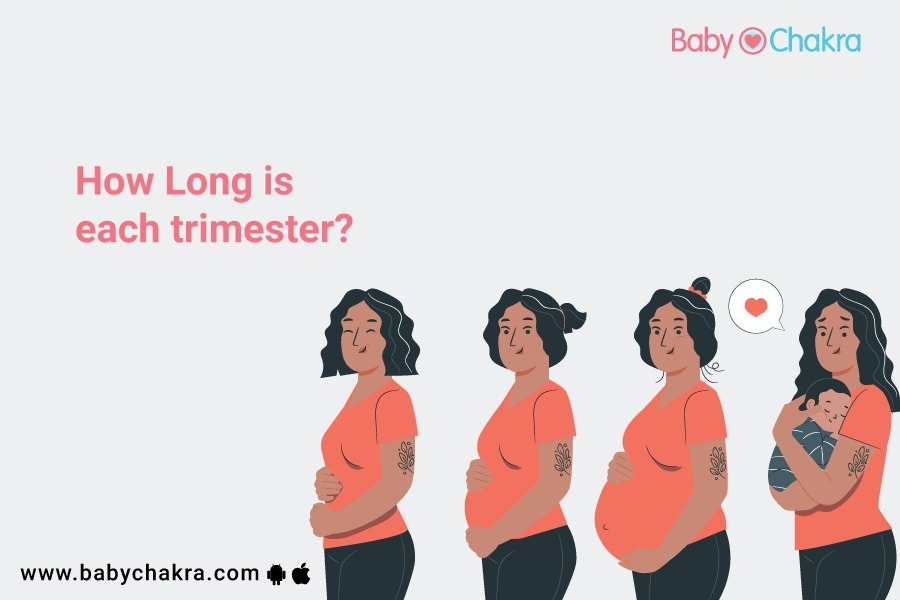
How Long Is Each Trimester?
16 Nov 2021 | 4 min Read
Babychakra
Author | 1369 Articles
If you have tried searching the web to find out when each trimester begins and ends, you would have found many answers to this question.
A typical pregnancy has 40 weeks of gestation that starts from the first day of your last period and ends at the birth of your baby. This entire gestational period is divided into three broad categories called Trimesters. And the fetus undergoes several changes during each trimester.
So, in this article, you will find your answer with body changes and fetal development happening during each trimester.
First Trimester (0 week – 13th Week)
The first trimester of the pregnancy starts with the first days of your last menstrual period (LMP) and ends with the last day of the 13th week of pregnancy. It is a time of great anticipation and rapid changes for both you and your baby. Knowing what is happening during the first trimester can help you get ready for the upcoming months.
First Trimester Changes in Body
Pregnancy is different for every woman. Some women experience severe pregnancy symptoms, while some get a pregnancy glow. Here are some of the body changes you will observe during the first trimester of pregnancy.
- Implantation Bleeding – light spotting
- Breast Tenderness – Sore breast triggered by hormonal changes.
- Constipation – caused by changes in the level of progesterone hormone and extra iron from prenatal vitamins.
- Fatigue
- Food aversions
- Vaginal discharge
- Frequent urination
- Heartburn
- Morning Sickness
- Mood Swings
Fetal Development During First Trimester
During the first trimester of pregnancy, i.e., until the 13th week of your pregnancy, your fertilised egg will transform into a fully formed fetus. All significant organs will start developing and taking their shapes. This will include the formation of the baby’s brain and spinal cord, functioning of nerves and muscles, heart and its beat – 120 to 160 beats per minute, development of the digestive system, kidneys, lungs and other major organs.
Second Trimester (14th week – 27th Week)
The second trimester of pregnancy is the time when many women feel well and energise. The baby bump starts showing up but is still not so difficult to carry. This is the time of rapid growth and development for your baby, and you will find yourself engaged with health check-ups.
Second Trimester Changes in Body
During the second trimester, the uterus grows, and you may feel discomfort and aches as the uterus ligament starts stretching. You may also experience mild itching and stretch marks.
Fetal Development During the Second trimester
Your baby will grow from around 7.5cm during the second trimester, weighing 30 grams in week 13 to approximately 23cm and 820 grams in week 26.
During these three months, your baby’s organs will continue to develop, and the liver, pancreas and kidneys all start to function. Your baby will be able to move freely within the amniotic sac in your uterus. You may feel fetal movement by about week 19 (or sooner if this isn’t your first pregnancy). By week 20, your baby can hear sounds, including the sound of your heartbeat, and they are learning to recognise your voice, although the ears are not yet fully formed.
Third Trimester (28th week – 40 Week)
The third trimester of pregnancy starts from week 28 and continues through the time you deliver your baby, which is around the 40th week.
Third Trimester Changes in Body
Your body will continue to experience pregnancy symptoms like backaches, shortness of breath, heartburn, varicose veins, frequent urination, and sometimes, haemorrhoids too.
Your skin and ligaments continue to stretch to accommodate your growing baby. You get more tired these days but won’t be able to sleep peacefully.
Fetal Development During the Third trimester
By week 31, the baby’s lungs are mature and in the final stage of completion. Your baby will move in a head-down position to get ready to pass through the birth canal. Through the third trimester, you will have frequent antenatal check-ups to monitor the development of your baby.
Weight gain is a normal part of the pregnancy, and by the end of your third trimester, you must have gained between 11 kgs to 16 kgs.
By 40 weeks, your baby will be about 50cm and weigh approximately 3.4kg. Developmentally, your baby is now ready to be born.
Was this article helpful? If yes, please hit the ‘LIKE’ button to show some love, and ‘SHARE’ this with your friends and family.
A


Related Topics for you
Suggestions offered by doctors on BabyChakra are of advisory nature i.e., for educational and informational purposes only. Content posted on, created for, or compiled by BabyChakra is not intended or designed to replace your doctor's independent judgment about any symptom, condition, or the appropriateness or risks of a procedure or treatment for a given person.
